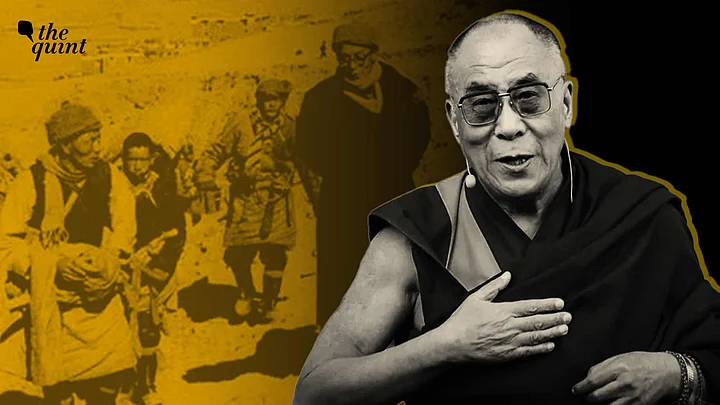It would be three more years before all Nehruvian idealism and illusions were smashed and pulverised into smithereens. It was about ten years after Sardar Vallabhbhai Patel had formally warned Jawaharlal Nehru to not place trust in the perfidious communist regime of China led by Mao Ze Dong.
Till date, this event remains a shining example of how India has always embraced and given shelter to refugees fleeing persecution by authoritarian regimes.
In March 1959, convinced that he would be either killed or "disappeared” by the Chinese regime, the 24-year-old Dalai Lama, the spiritual as well as temporal head of Tibet, undertook a perilous journey through remote mountain passes and reached India.
There had been an uprising of Tibetan monks and people against the brutal annexation and occupation by China and thousands were massacred in reprisal by Chinese troops. The Dalai Lama was welcomed with open arms and allowed to set up a government in exile that is now headquartered in Dharamshala in Himachal Pradesh.
Why India Hesitated To Take Up Tibet’s Cause?
Since March 1959, the Dalai Lama and his followers have made India their home. The Dalai Lama is now about 90 years old and knows that China will completely control his beloved homeland Tibet till he passes away. There are times when the sword is mightier than the pen.
Tibet is a tragedy that all well-meaning people across the world mourn. The authors do too. But they are more fascinated by the manner in which successive regimes in India have failed to offer a robust counter to the expansionist intentions of China on a sustained basis.
It is only in recent years that Indian foreign policy mavens have started openly saying that the relationship with China is neither normal nor good and that there is indeed a trust deficit.
This kind of language was perhaps used earlier, but usually in diplomatic missives to other countries that were supposed to remain confidential (Example: In a confidential memo to the US President Bill Clinton after the 1998 nuclear tests, Prime Minister Atal Bihari Vajpayee had singled out the threat posed by China as the primary reason for India going openly nuclear. The letter was leaked by aides of Clinton).
Why this has been so remains a mystery to the authors. Some argue that the hangover of the Nehruvian idealism has lasted far longer than required. The authors will come to how Nehru completely misjudged China later.
Modi-Xi Bonhomie Couldn’t Save the Day for India-China Ties
But let's first look at more contemporary history. Nobody will accuse Narendra Modi of being shaped in the Nehruvian mold. What was the approach of his regime towards China after he became prime minister?
By then, Xi Jinping was two years into leading China and was already showing early signs of being a reincarnation of Mao Ze Dong. Modi gambled big on improving relationships with China. Definitely not in the Hindi-Chini Bhai Bhai manner, but there could be no doubting the effort.
Between 2014 and 2020, Modi and Xi had met 18 times during bilateral and multilateral gatherings. Modi had travelled five times to China as PM. He had officially hosted Xi twice for bilateral summits, with visuals from Ahmedabad in 2015 and Mahabalipuram in 2019 presenting a picture of dialogue laced with bonhomie.
All that dip magic effort went up in a cloud of smoke in June 2020 when 20 Indian soldiers including a serving Colonel lost their lives in a bloody combat with Chinese troops in Ladakh's Galwan Valley. There have been credible reports that many more Chinese troops were killed.
Since then, more than 50,000 soldiers from both sides have been facing each other eyeball to eyeball. Many critics of Modi have used this event to claim his foreign policy has been a failure and that he has "surrendered” Indian land to China.
The authors have no desire to join that debate.
Suffice it to say that India has never before seen the kind of troop mobilisation and rapid infrastructure development in areas bordering China that has been seen since the Galwan perfidy. But even supporters of Modi would have to concede that he misjudged the true intentions of Xi Jinping.
Did Modi Overlook Possibilities of Galwan Violence?
Similarly, even admirers of Nehru would have to concede that the Galwan tragedy was not of Himalayan proportions that India’s first PM failed to anticipate despite enough warnings and signals. Sardar Patel died in 1950 soon after China annexed Tibet. The decade of the 1950s was spent by Nehru trying to forge a special bond through "Panchsheel” and other assorted policies with China.
Even the brutal crackdown on Tibet by the Chinese military had no effect. Or even the capture of Aksai Chin, a gift from Pakistan, failed to move Nehru.
Since then, the sad story has been repeated numerous times into which the authors won't dive into detail. In October 1962, China invaded India and inflicted such a crushing and humiliating defeat that the trauma survives to date. The co-author was in Assam this February and heard elderly people in Tezpur describing how they had felt abandoned by India because Nehru had delivered a public address to the nation to that effect.
It is pointless blaming Nehru seven decades after he tried idealism with China and failed miserably. Perhaps, that was a different era. But the lessons learnt from that debacle must not be forgotten.
(Yashwant Deshmukh and Sutanu Guru work with the CVoter Foundation. This is an opinion piece and the views expressed are the authors' own. The Quint neither endorses nor is responsible for them.)
